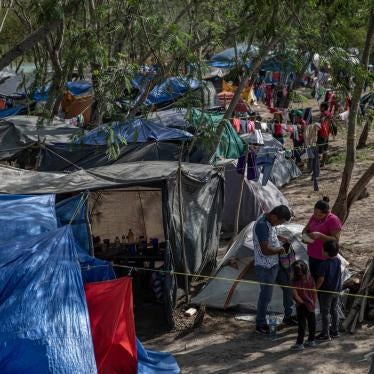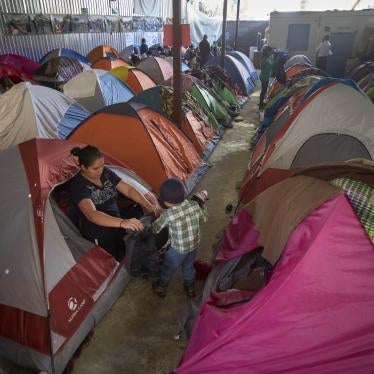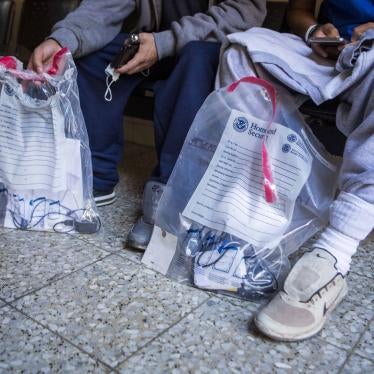(Washington, DC) – The United States government should immediately impose a moratorium on deportations during the Covid-19 pandemic to avoid contributing to the global spread of the virus, Human Rights Watch said today.
The United States has the highest known number of Covid-19 cases in the world and the largest numbers of migrants detained in centers where social distancing is impossible and people often lack access to adequate sanitation, hygiene supplies, or medical care. The government has nevertheless continued to deport people who have been held in these facilities. US Immigration and Customs Enforcement (ICE) carried out 232 deportation flights to Latin America and Caribbean countries between February 3 and April 24, 2020, according to the Center for Economic and Policy Development. Some migrants deported to Mexico, Haiti, El Salvador, and Guatemala have already tested positive for the Covid-19 virus.
“Despite outbreaks of Covid-19 in US immigration detention centers and government travel restrictions the world over, the US has continued deportations with little regard for the consequences,” said Nicole Austin-Hillery, US program director at Human Rights Watch. “With these reckless deportations, the Trump administration is contributing to the spread of Covid-19 and endangering public health globally.”
The United Nations Network on Migration, which includes the UN Office of the High Commissioner for Human Rights and the UN refugee agency, on May 13, called on governments to “suspend forced returns during the pandemic, in order to protect the health of migrants and communities, and uphold the human rights of all migrants, regardless of status.” It added that “[f]orced returns can intensify serious public health risks for everyone – migrants, public officials, health workers, social workers and both host and origin communities,” and “place additional strain on countries of return.” Many European countries have already imposed a de facto moratorium on deportations amid other travel restrictions and released people from immigration detention.
As of June 1, more than 1,406 immigration detainees in the US had tested positive for the coronavirus, according to ICE. The number of detainees who’ve fallen ill is most likely much higher given the relatively low number that ICE has reported testing – fewer than 12 percent of detainees.
Human Rights Watch has long documented the dangerously substandard medical care prevalent at ICE detention centers. The agency has previously failed to prevent the spread of infectious diseases, in part due to the high number of detained immigrants it transfers from one facility to another, facilitating transmission. Asylum seekers at a detention center in Texas told the media in May that detainees had not been given masks or gloves and lived in dorms where social distancing was impossible, and alleged that ICE had not provided medical care to people with respiratory symptoms. The media reported that in another Texas detention facility, migrants had to pay for soap.
Those deported to their countries of origin may lack access to health care, housing, and other necessary support, especially critical during the pandemic. Due to strict lockdowns in some countries, public transportation remains shut down, making it difficult for detainees to reach their families, particularly in rural areas. Workers in Guatemala told Human Rights Watch that shelters that typically receive deportees have stopped receiving new arrivals, citing concerns about spreading the pandemic.
In Mexico, a coronavirus outbreak at a shelter in Tamaulipas State was linked to a migrant whom the US had deported. Dozens of migrants have tested positive for the virus after being deported to Guatemala. Although the Guatemalan government briefly suspended deportations from the United States, deportations have since resumed. US deportations to El Salvador and Honduras continue.
Although ICE stated that it is now testing migrants before deporting them to Guatemala, a Homeland Security official said ICE is unlikely to perform tests on other deportees unless the receiving country required such tests. Instead, ICE has been screening deportees by checking for fever and other symptoms. Public health experts have widely reported that many people with the virus are asymptomatic, meaning that such screenings are not an adequate preventive measure.
The Department of Homeland Security has also used an order by the US Centers for Disease Control and Prevention (CDC) as cover to turn away asylum seekers, including unaccompanied children, at the border. This violates their right to seek asylum under international law. ICE has expelled over 20,000 migrants and asylum seekers to Mexican border cities, while flying others to their countries of origin with deportees who may have the virus. Some of those expelled to Mexico were subsequently bused to the Mexican-Guatemalan border and encouraged to leave Mexico or have been deported to their home countries.
Human Rights Watch has previously urged the Department of Homeland Security to end its rapid expulsion policy, in part because it increases the risk that Covid-19 will spread in overcrowded and unhygienic makeshift camps and shelters along the border. The expulsions risk spreading the virus further through Mexico and into Central America.
The US government should not force deportees to travel so long as it puts them and their communities at heightened risk of Covid-19, Human Rights Watch said. ICE should also halt involuntary transfers of migrants between facilities, and put in place policies at detention centers that would allow safe social distancing and effective hygiene for as long as detainees remain in custody.
ICE should test migrants who wish to voluntarily return to their country of origin or who voluntarily accept transfers to other detention centers in the United States for Covid-19 and advise them on protecting themselves and others from the virus.
A moratorium on deportations should not result in the indefinite detention of people with final orders of removal, particularly given the need during the pandemic to reduce the population in immigration detention. Rather, the US government should release migrants, unless lawfully held as a “last resort,” and pursue community-based alternatives to detention consistent with international legal standards.
“US efforts to fight the pandemic won’t be effective if immigration policies and practices disregard migrants and asylum seekers’ rights to life and health,” Austin-Hillery said. “By putting a moratorium on deportations, the United States can limit the spread of Covid-19 to other countries and focus more resources on protecting US residents.”
|
News Release
US: Suspend Deportations During Pandemic
Forced Returns Risk Further Global Spread of Virus
Your tax deductible gift can help stop human rights violations and save lives around the world.
Region / Country
Tags
Most Viewed
-
November 25, 2019
A Dirty Investment

-
May 12, 2025
The Gig Trap

-
April 27, 2021
A Threshold Crossed

-
January 23, 2018
Hidden Chains

-
September 30, 2024
“They Destroyed What Was Inside Us”





